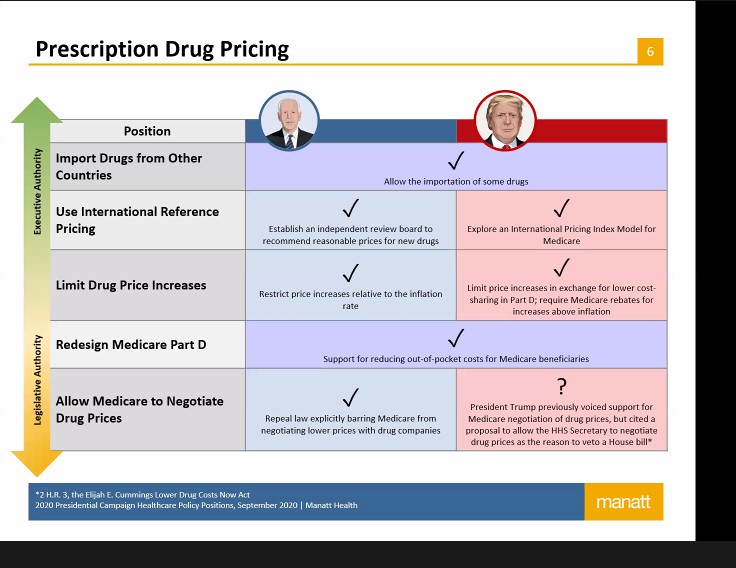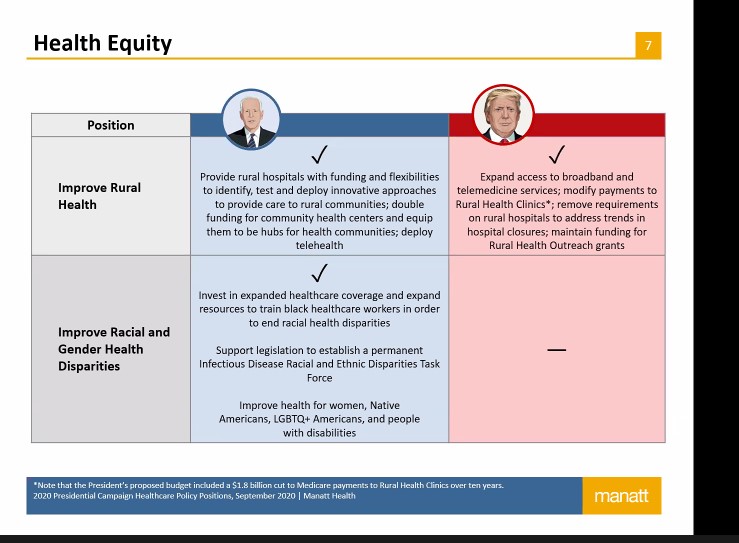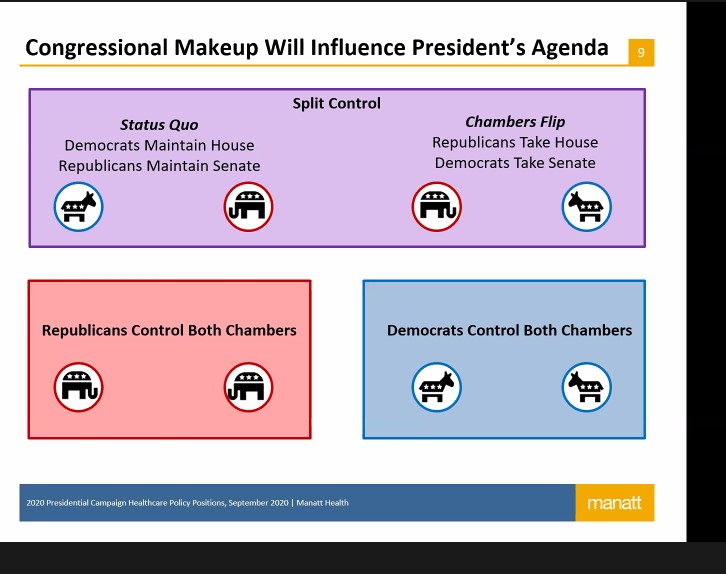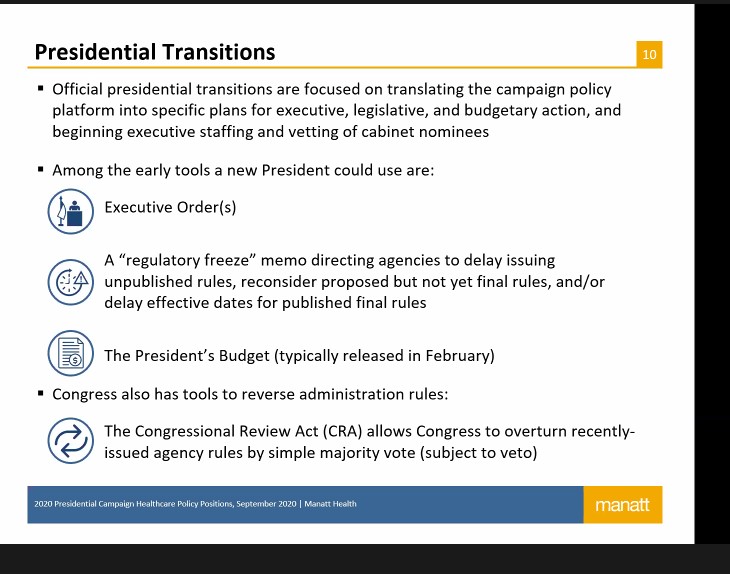Health Care Discussion Moves From COVID-19 To Obamacare
The national health care discussion is shifting from COVID-19 to the Affordable Care Act as the death of Supreme Court Justice Ruth Bader Ginsburg leads to questions of how a newly-appointed high court judge would rule in a case that challenges the constitutionality of the health care law.
That was the word during a Manatt Health webinar this week on “2020 Presidential Health Care Policy Positions.” Although the session focused on the differences in health care policy between President Donald Trump and his Democratic challenger Joe Biden, Ginsburg’s death and its impact on the ACA also were part of the discussion.
The Supreme Court will decide the fate of the ACA as it hears arguments Nov. 10 in the case of Texas v. United States. The case was filed by 20 Republican state attorneys general and governors and two individuals after Congress eliminated the individual mandate penalty in 2017. They argued that the mandate is no longer constitutional and asked that the entire law be struck down.
Trump announced he will nominate Ginsburg’s successor in a matter of days and the Republican-led Senate is expected to confirm the nominee.
“I think one of the most immediate effects of Justice Ginsburg’s death is that we're really seeing the health care discussion shift to being about the ACA again,” said Chiquita Brooks-LaSure, Manatt’s managing director. “Lately, there has been much more focus on COVID-19 for obvious reasons. But now, attention is shifting to the court case and – depending on who wins the presidential election – the next administration will take a different tack in terms of defending the ACA.”
Who fills Ginsburg’s seat on the high court and the decisions made by the court in the future will have significant implications on the future of health care reform in the U.S., Brooks-LaSure added.
Trump V. Biden - Health Care Priorities
If there is a change in administration after Election Day, we can expect to see significant action impacting health care in the final days of 2020 and the first few weeks of 2021, said Allison Orris, counsel with Manatt. The presidential transition period could see an uptick in activity such as executive orders as the Trump administration “tries to clear the decks and get their last policy priorities out the door before there’s a change in position.”
“The goal for an incoming administration would be to hit the ground running by using the period between Election Day and inauguration to prepare to govern,” she said. “And one aspect of this work is to formalize executive branch staffing and vetting of Cabinet nominees. Another key task is to translate the campaign's health care platform into specific plans for executive, legislative and budgetary action.”
Usually, a new president will send out a number of executive orders immediately after the inauguration, Orris said, adding that she expects the same would happen if Biden becomes president.
“A new administration will often take immediate steps on day one to make sure that the previous administration's policies don't continue automatically,” she said. What typically happens is that an incoming White House Chief of Staff will issue a regulatory freeze memo directing agencies to delay issuing regulations or to reconsider proposed but not yet final goals and or delay the effective dates of rules that have been published, in order to give the incoming administration time to assess possible changes.
Congress Is Key
No matter the results of the presidential election, the makeup of the new Congress will be key to enacting much of the president’s health care agenda.
“For example, if Trump retains the presidency, but at least one chamber is controlled by the Democrats, will see some limitation in what he is able to enact,” Orris said. “Also, if Biden is elected president and control of the Senate goes to Democrats, but they only have a slim majority, he will have difficulty advancing his health care legislative proposals as well.”
A change in administration also means Congress can roll back policies of the previous president, Orris said. The Congressional Review Act allows Congress to disapprove a broad range of regulatory rules issued by federal agencies by a simple majority. The CRA is most likely to be used during a presidential transition to overturn the previous administration's goals.
But the CRA could be used without changing the presidency, Orris said, if Congress and the president are of different parties, but Congress has enough votes to overturn a presidential veto of a resolution.
Susan Rupe is managing editor for InsuranceNewsNet. She formerly served as communications director for an insurance agents' association and was an award-winning newspaper reporter and editor. Contact her at Susan.Rupe@innfeedback.com. Follow her on Twitter @INNsusan.
© Entire contents copyright 2020 by InsuranceNewsNet.com Inc. All rights reserved. No part of this article may be reprinted without the expressed written consent from InsuranceNewsNet.com.










COVID-19 Pushes RILA Growth, Annuity Acceptance, Panel Says
Americans Find Breathing Room Amid Market Volatility, Allianz Says
Advisor News
- Americans increasingly worried about new tariffs, worsening inflation
- As tariffs roil market, separate ‘signal from the noise’
- Investors worried about outliving assets
- Essential insights a financial advisor needs to grow their practice
- Goldman Sachs survey identifies top threats to insurer investments
More Advisor NewsAnnuity News
- AM Best Comments on the Credit Ratings of Talcott Financial Group Ltd.’s Subsidiaries Following Announced Reinsurance Transaction With Japan Post Insurance Co., Ltd.
- Globe Life Inc. (NYSE: GL) is a Stock Spotlight on 4/1
- Sammons Financial Group “Goes Digital” in Annuity Transfers
- Somerset Reinsurance Announces the Appointment of Danish Iqbal as CEO
- Majesco Announces Participation in LIMRA 2025: Showcasing Cutting-Edge Innovations in Insurance Technology
More Annuity NewsHealth/Employee Benefits News
- ‘They won’t help me’: Sickest patients face insurance denials despite policy fixes
- Thousands of Missouri construction workers with Anthem health insurance left scrambling
- Don't let death penalty turn Luigi Mangione into a martyr
- More than 5M could lose Medicaid coverage if feds impose work requirements
- Don't make Mangione a martyr
More Health/Employee Benefits NewsLife Insurance News
- 2024 ModeSlavery Report (bpcc modeslavery report 2024 en final)
- Exemption Application under Investment Company Act (Form 40-APP/A)
- Annual Report 2024
- Revised Proxy Soliciting Materials (Form DEFR14A)
- Proxy Statement (Form DEF 14A)
More Life Insurance News